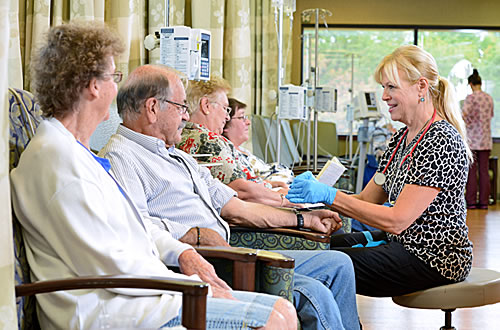Your cancer journey is unique. At Alliance Cancer Specialists, we understand that your cancer diagnosis and treatment will not only affect you but can also impact your family and friends who support you. During your consultation, your physician will take the time to get to know you, the details of your condition, any other medical problems, your home and support system, lifestyle and personal preferences in order to outline a treatment plan that is tailored for you, your diagnosis, and risk factors.
Cancer Treatments Provided at Our Offices
Each of our practices are staffed by board-certified and experienced Physicians, Advanced Practice Providers, and Oncology Nursing Society (ONS)-certified specialty Nurses. We are highly qualified to administer the full range of state-of-the-art anti-cancer treatments (Chemotherapy, Immunotherapy, Targeted Therapy) and Supportive care to our patients.
Chemotherapy is the term given to describe a class of drugs which alter the growth and spread of cancer cells, usually by direct or indirect destruction of the cancer cells. Chemotherapy agents can be given by mouth (oral), or by injection through the veins (intravenous), under the skin (subcutaneous), or less commonly into the muscle (intramuscular). Your treatment program may involve one or multiple chemotherapy drugs, given on a regular schedule, for a defined period of time (weeks to several months), or long-term.
Immunotherapy involves the use of drugs which work by harnessing or activating your immune system cells to attack the cancer, much in the way that your immune system defends your body against bacteria or viruses. These drugs are usually given by intravenous administration, and can be given alone or combined with other types of drugs to treat cancer.
Targeted Therapy agents are specially designed drugs which disable cancer cells by acting against a portion of the cancer cell which is specific for that type of cancer. Detailed tests (which may include a type of test known as Next Generation Sequencing) are performed on the cancer cells to identify that the “target” is present to allow these drugs to be given. Targeted therapy drugs are extremely effective and are generally better tolerated than traditional chemotherapy drugs. Many can be taken by mouth and can be safely and effectively used for long periods of time. Like immunotherapy agents, targeted therapy can be given alone or with chemotherapy.
Supportive Care involves the use of anti-nausea medications, intravenous fluids, drugs to prevent allergic reactions, and drugs to stimulate the production of blood cells (growth factors) when needed. Supportive care is a critical part of the cancer treatment process and often makes the treatment process tolerable and comfortable for patients and thus improves the odds of a successful treatment result.

